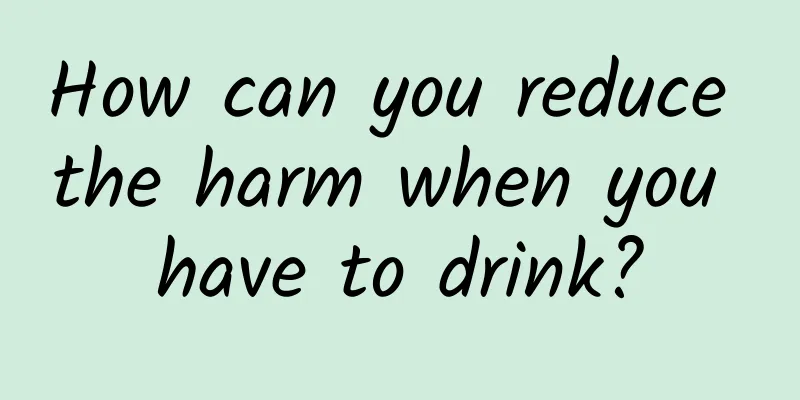How can you reduce the harm when you have to drink?

|
Expert of this article: Li Tian, Chief Physician, The Fifth Affiliated Hospital of Guangzhou Medical University Alcohol is a love-hate relationship for many people. They love to drink but are well aware of the harm of alcohol. Every year, the number of people who suffer from diseases due to excessive alcohol intake increases, and severe cases may even cause sudden death or cancer. According to a briefing released by the World Heart Federation (WHF) entitled "The Impact of Alcohol Consumption on Cardiovascular Health: Myths and Measures", approximately 230 diseases are related to alcohol, including 40 diseases that would not be prevalent without alcohol. Many times, we can control ourselves from drinking, but in some cases we have to drink. So how can we minimize the harm of alcohol to our bodies? The following precautions are recommended for collection~ Before drinking Do not drink on an empty stomach Alcohol is absorbed faster on an empty stomach, making it easier for people to get drunk. Before drinking, you can eat some high-fat, high-protein or high-carbohydrate foods (especially soluble carbohydrates such as steamed buns, bread, noodles or rice, etc.), which can delay gastric emptying, delay the absorption of alcohol in the body, reduce the direct stimulation and damage of alcohol to the esophagus and stomach, and reduce the incidence of drunkenness and stomach problems. You can drink milk or yogurt half an hour before drinking. The protein attached to the surface of the gastric mucosa can play a protective role, reduce the irritation of alcohol to the stomach, and slow down the absorption of alcohol. You can also drink some sugar water. Sugar helps speed up the liver's metabolism of alcohol and is also helpful in correcting the problem of hypoglycemia after drinking in some people. In addition, under the guidance of a doctor, you can take some drugs to protect the gastric mucosa or drugs to inhibit gastric acid secretion (except H2 receptor antagonists) before drinking, which can also play a certain protective role. Limit your drinking Alcohol is a Class 1 carcinogen defined by the World Health Organization's International Agency for Research on Cancer (IARC). Excessive drinking can damage the gastric mucosa and lead to fatty liver, liver fibrosis, cirrhosis, acute cholecystitis, acute pancreatitis and other diseases. Excessive drinking can also increase the risk of high blood pressure, stroke, breast cancer, digestive tract cancer and osteoporosis. The Dietary Guidelines for Chinese Residents (2016) recommends that men should not drink more than 25 grams of alcohol a day, and women should not drink more than 15 grams a day, otherwise it is considered excessive drinking. 25 grams of alcohol is equivalent to no more than 1 liang of liquor, no more than 1 bottle of beer, and no more than 1 glass of red wine each time. The research results published in the journal The Lancet Oncology also show that drinking small amounts of alcohol can also cause cancer! Heavy drinking (>60 g/day) – 346,400 new cancer cases Risky drinking (20-60 g/day) – 291,800 new cancer cases Moderate alcohol consumption (<20 g/day) – causes more than 100,000 new cancer cases Even if you drink less than 10g of alcohol a day, it still causes 41,300 new cases of cancer worldwide Better low than high The alcohol content of strong liquor is relatively high, and compared with low-alcohol liquor, it can completely achieve the effect of "one mouthful is equivalent to three mouthfuls". Under the same amount of conditions, the higher the alcohol content, the greater the damage to the digestive system organs. In wine Don't drink with carbonated drinks Some people believe that adding carbonated drinks to wine can dilute the alcohol concentration and make it taste better, leading to more drinking. The gas in carbonated drinks - carbon dioxide, not only expands the volume of the stomach, but also speeds up the rate at which alcohol enters the small intestine from the stomach. The small intestine has a much stronger ability to absorb alcohol than the stomach. Drink slowly After drinking, ethanol enters the blood within a few minutes, and the ethanol concentration in the blood reaches its highest level in 30-120 minutes. Drinking quickly will increase the ethanol concentration quickly, and you will soon enter a state of drunkenness. Food and drink combination Drinking large amounts of alcohol will consume vitamins in the body, hinder the absorption of B vitamins, and weaken the liver's detoxification function. Coarse grains, whole wheat bread, oats, wheat bran, most green leafy vegetables, and soy products are rich in B vitamins. For example, the antioxidants and vitamins in green leafy vegetables and the lecithin in soy products all have a protective effect on the liver. Don't mix drinks When different alcoholic beverages are mixed, they will react with each other. The human body cannot adapt to the rapid changes in alcohol content, which will cause us to drink too much without realizing it. It will also show a certain "synergistic effect" that promotes the absorption and penetration of high-concentration alcohol in the human body, causing greater harm to the human body. Drink more boiled water Drinking more water when drinking can help promote the dilution and metabolism of alcohol, accelerate the excretion of alcohol in the body, and reduce discomfort such as thirst after drinking. After drinking Don't drink tea right away, especially strong tea Because most of the alcohol is first metabolized in the liver, it is first oxidized into acetaldehyde under the action of oxidase, and finally oxidized into carbon dioxide and water, and then excreted through the lungs and kidneys respectively, thereby playing a role in sobering up. This decomposition generally takes 2 to 4 hours. The main ingredient of tea is theophylline. The large amount of theophylline in strong tea has a diuretic effect, which can easily cause dehydration of the body. It can also cause acetaldehyde that has not yet been decomposed to enter the kidneys prematurely, affecting kidney function. Don't drink coffee The main ingredient of coffee is caffeine, which neither accelerates alcohol metabolism nor reduces the harm to the body. Drinking coffee after drinking alcohol will excite the central nervous system, thereby dilating capillaries, leading to symptoms such as dizziness and headaches. Caffeine also has a diuretic effect, which will aggravate dehydration and make the drunkard "worse than worse." Don't take a shower right away Alcohol inhibits liver activity and hinders the release of glycogen. At the same time, the sympathetic nerve excitement after drinking consumes a lot of blood sugar. If you take a shower immediately after drinking, the blood sugar in the body cannot be replenished in time, which can easily cause dizziness, palpitations, fatigue and even hypoglycemia coma. In addition, hot baths can dilate blood vessels, which can easily lead to insufficient blood supply to the brain and increase the risk of cardiovascular and cerebrovascular diseases. Preventing accidental inhalation after drinking When a drunk person vomits, the vomit can be easily inhaled into the airway. People around the drunk person should remember to let the drunk person lie on his side, not on his back, to prevent the vomit from being inhaled into the airway and causing aspiration pneumonia or suffocation. If a drunk person loses control of his behavior, turns pale, has cold and wet skin, or is unconscious, call 120 as soon as possible and send him to the nearest hospital for treatment. Do not delay. Avoid inducing vomiting Although inducing vomiting by scratching the throat with hands has a certain effect and alcohol will not be absorbed by the body after vomiting, induced vomiting may make nausea and vomiting more severe. Severe vomiting may increase the pressure in the duodenum, hinder the normal outflow of pancreatic juice, activate pancreatic enzymes prematurely, and lead to acute pancreatitis; it may cause tearing of the cardiac mucosa at the connection between the esophagus and stomach, and even heavy bleeding; during vomiting, alcohol, stomach acid, etc. will damage the esophagus again, causing reflux esophagitis. The safest alcohol intake is "0" I hope everyone can reduce or stop drinking. The pictures in this article with the "Science Popularization China" watermark are all from the copyright gallery. The pictures are not authorized for reprinting. |
<<: Why are twins considered a gift from God to geneticists?
>>: How can we have healthy sleep during the epidemic?
Recommend
The marketing hotspot for the whole year of 2018, a must-have for operators and promoters! !
In the blink of an eye, it is the end of 2017 aga...
The most comprehensive | 108 ways to promote products, come and try
1. SNS online store soft article promotion method...
My neck makes a crackling sound when I turn it. Is it cervical spondylosis? The truth is...
Myth: "If you hear a crackling sound when yo...
Which tablet system is better? iOS 9 vs. Windows 10
As we all know, the tablet market today has been ...
Still eating and drinking as you please? Be careful to "pick" out colon cancer...Have you fallen into these eating habits?
Our physical health is closely related to our eat...
7-Day Primer on Portfolio Strategy
Introduction to the 7-day introductory resource f...
[Live] Wang Jian, Technical Director of iFlytek Open Platform: How to create a natural human-computer interaction experience
[51CTO.com original article] Since the birth of c...
Are there good and bad birthmarks? If you have one like this, it may turn into a malignant one, so be careful!
Expert of this article: Yang Shi, Associate Resea...
They look stunning but their survival is questionable. Why should we care about parrot protection?
Produced by: Science Popularization China Author:...
International Polar Bear Day: As sea ice melts, where will they go?
February 27th of every year It's Internationa...
10 programming habits that are harmful to your development projects
Avoiding these common coding habits will make our...
Apple will set off a new wave of smart hardware in 2015
Although the much-anticipated Apple Watch will no...
Gree mobile phone passed the Ministry of Industry and Information Technology registration and its complete configuration was exposed for the first time
[[131068]] On April 1, data from the Ministry of ...
3 templates for high-conversion promotion ideas!
How to write a stunning opening for your creative...
How much does it cost to make a car moving app in Zhangjiakou?
There is no fixed price for the production of Zha...









